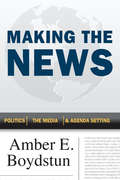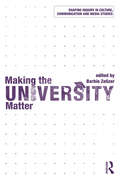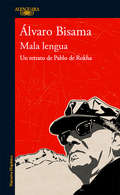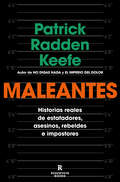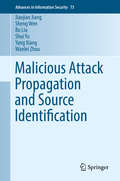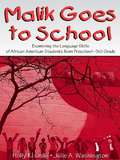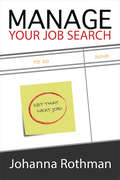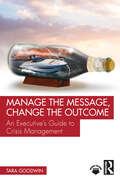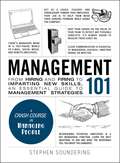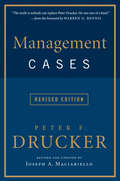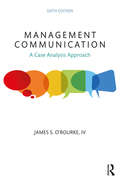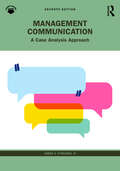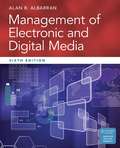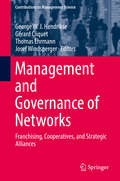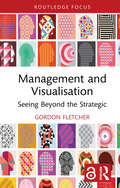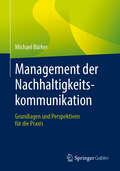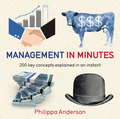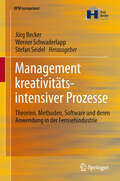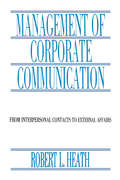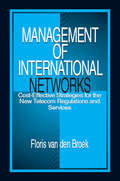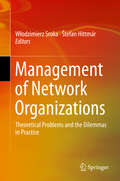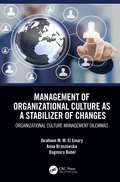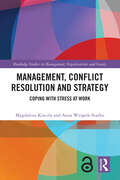- Table View
- List View
Making the News: Politics, the Media, and Agenda Setting
by Amber E. BoydstunMedia attention can play a profound role in whether or not officials act on a policy issue, but how policy issues make the news in the first place has remained a puzzle. Why do some issues go viral and then just as quickly fall off the radar? How is it that the media can sustain public interest for months in a complex story like negotiations over Obamacare while ignoring other important issues in favor of stories on "balloon boy?" With Making the News, Amber Boydstun offers an eye-opening look at the explosive patterns of media attention that determine which issues are brought before the public. At the heart of her argument is the observation that the media have two modes: an "alarm mode" for breaking stories and a "patrol mode" for covering them in greater depth. While institutional incentives often initiate alarm mode around a story, they also propel news outlets into the watchdog-like patrol mode around its policy implications until the next big news item breaks. What results from this pattern of fixation followed by rapid change is skewed coverage of policy issues, with a few receiving the majority of media attention while others receive none at all. Boydstun documents this systemic explosiveness and skew through analysis of media coverage across policy issues, including in-depth looks at the waxing and waning of coverage around two issues: capital punishment and the "war on terror. " Making the News shows how the seemingly unpredictable day-to-day decisions of the newsroom produce distinct patterns of operation with implications--good and bad--for national politics.
Making the University Matter (Shaping Inquiry in Culture, Communication and Media Studies)
by Barbie ZelizerMaking the University Matter investigates how academics situate themselves simultaneously in the university and the world and how doing so affects the viability of the university setting. The university stands at the intersection of two sets of interests, needing to be at one with the world while aspiring to stand apart from it. In an era that promises intensified political instability, growing administrative pressures, dwindling economic returns and questions about economic viability, lower enrolments and shrinking programs, can the university continue to matter into the future? And if so, in which way? What will help it survive as an honest broker? What are the mechanisms for ensuring its independent voice? Barbie Zelizer brings together some of the leading names in the field of media and communication studies from around the globe to consider a multiplicity of answers from across the curriculum on making the university matter, including critical scholarship, interdisciplinarity, curricular blends of the humanities and social sciences, practical training and policy work. The collection is introduced with an essay by the editor and each section has a brief introduction to contextualise the essays and highlight the issues they raise.
Mala lengua: Un retrato de Pablo de Rokha
by Álvaro BisamaMagistral crónica que retrata al poeta Pablo de Rokha, una de las figuras más intensas y combativas de la literatura chilena. Deslenguado, siempre polémico, atravesó buena parte del siglo ganando amigos y detractores, escribiendo una obra inmensa y fundamental, mientras la de sus compañeros de generación, entre ellos Mistral, Neruda y Huidobro, recorría el mundo de manera inédita hasta entonces. La de De Rokha es una historia llena de piezas extraviadas que Álvaro Bisama reconstruye de forma admirable. Cómo fue armándose su clan y familia, la fulminante historia de amor con Winétt, la guerrilla literaria en la que disparó sin piedad, su soledad como escritor, sus viajes por el Chile rural, sus inolvidables comidas y celebraciones, su compleja adhesión al Partido Comunista, el relato de sí mismo que construyó en su obra, las muertes trágicas que enlutaron sus días, entre otras circunstancias, dibujan aquí no solo la vida del poeta, también un momento histórico que vio nacer a los grandes genios de la poesía chilena. Mala lengua es eso y también un fascinante relato de los cambios culturales y sociales que marcaron a fuego el siglo XX latinoamericano.
Maleantes: Historias reales de estafadores, asesinos, rebeldes e impostores
by Patrick Radden KeefeTras No digas nada y El imperio del dolor, Patrick Radden Keefe explora los límites, a menudo imperceptibles, entre lo legal y lo ilegal, a través de doce retratos reales protagonizados por maleantes de medio mundo LIBRO DE LA SEMANA POR EL PERIÓDICO «Keefe hahecho carrera sumergiéndose en personajes fascinantes, en eso es el mejor. [...] En Maleantes regresa con su altísimo rigor periodístico y la misma pasión de siempre por desvelar misterios, con un resultado inconfundible».New York Times Book Review «Un narrador virtuoso».The Washington PostCon el fascinante estilo que le caracteriza, Patrick Radden Keefe ofrece en este libro una compleja panorámica del lado oscuro del ser humano. Aquí retrata, entre otros personajes, al traficante de armas Monzer al-Kassar, apodado «el príncipe de Marbella» y perseguido incansablemente por un agente de la D.E.A., a la controvertida «abogada del diablo» que lucha contra la pena de muerte representando a los peores criminales, al Chapo Guzmán y su vida tras huir de una prisión de alta seguridad, o al célebre delincuente holandés William Holleeder y los esfuerzos de su propia hermana para lograr su encarcelación. Maleantes recoge doce perfiles de estafadores, truhanes, asesinos y rebeldes, gente que nada a contracorriente y cuya vida excepcional, para bien y para mal, invita al lector a reflexionar sobre temas como la esencia del mal, del poder, del crimen y de la corrupción, pero también sobre el coraje de quienes decidieron enfrentarse a ellos. La crítica ha dicho... «Una obra rigurosa y literaria. [...] Honesto y escrupuloso, [Radden Keefe] es la cara y la cruz del periodismo».Marta Ailouti, El Cultural «Lo ha vuelto a hacer. Una no-ficción que se lee como un thriller y se sigue como la trama de una película. [...] La recomiendo mucho».Glòria Aznar, Diari de Tarragona «El catálogo de personajes que desfilan por aquí es digno del Hollywood más oscuro: crímenes, sí, pero también con glamur y carisma».Adrià Puértolas, El Nacional «El periodista narrativo más prestigioso de su generación».Gonzalo Suárez, El Mundo«Un conjunto de relatos con afán literario, como la antología de cuentos de un escritor con voluntad de estilo; solo que aquí prima la verdad, y los hechos de los relatos se ciñen a un concienzudo fact checking».José S. de Montfort, The Objective«La magnífica prosa de investigación de Keefe tiene elementos propios de la crónica literaria y podría recordar un poco a Gay Talese en el sentido de ser un periodista de raza que guarda el deseo de llegar al fondo de la cuestión en lo que tenga entre manos y una gran vocación de observador».Toni Montesinos, La Razón «Con su envidiable manera de mirar y contar, dibuja retratos depersonajes tan paródicos como crueles, estúpidos e insanos, tiernos y horribles. Talento y rigor».Carlos Zanón, La Vanguardia «Un nuevo libro de Keefe significa dejarlo todo y bajar las persianas; estarás pasando páginas durante horas».Los Angeles Times«Maleantes no es solo la muestra de lo buen periodista que es su autor, sino del inmenso poder del reportaje como género. Quizá el mayor don que tiene Keefe como escritor es la comodidad con la que se mueve en terrenos ambiguos, un recordatorio oportuno de que las cosas no son nunca blancas o negras».Toronto Star «Un espectacular libro de periodismo en mayúsculas».Irish Independent
Malicious Attack Propagation and Source Identification (Advances in Information Security #73)
by Bo Liu Yang Xiang Shui Yu Wanlei Zhou Sheng Wen Jiaojiao JiangThis book covers and makes four major contributions: 1) analyzing and surveying the pros and cons of current approaches for identifying rumor sources on complex networks; 2) proposing a novel approach to identify rumor sources in time-varying networks; 3) developing a fast approach to identify multiple rumor sources; 4) proposing a community-based method to overcome the scalability issue in this research area. These contributions enable rumor source identification to be applied effectively in real-world networks, and eventually diminish rumor damages, which the authors rigorously illustrate in this book. In the modern world, the ubiquity of networks has made us vulnerable to various risks. For instance, viruses propagate throughout the Internet and infect millions of computers. Misinformation spreads incredibly fast in online social networks, such as Facebook and Twitter. Infectious diseases, such as SARS, H1N1 or Ebola, have spread geographically and killed hundreds of thousands people. In essence, all of these situations can be modeled as a rumor spreading through a network, where the goal is to find the source of the rumor so as to control and prevent network risks. So far, extensive work has been done to develop new approaches to effectively identify rumor sources. However, current approaches still suffer from critical weaknesses. The most serious one is the complex spatiotemporal diffusion process of rumors in time-varying networks, which is the bottleneck of current approaches. The second problem lies in the expensively computational complexity of identifying multiple rumor sources. The third important issue is the huge scale of the underlying networks, which makes it difficult to develop efficient strategies to quickly and accurately identify rumor sources. These weaknesses prevent rumor source identification from being applied in a broader range of real-world applications. This book aims to analyze and address these issues to make rumor source identification more effective and applicable in the real world. The authors propose a novel reverse dissemination strategy to narrow down the scale of suspicious sources, which dramatically promotes the efficiency of their method. The authors then develop a Maximum-likelihood estimator, which can pin point the true source from the suspects with high accuracy. For the scalability issue in rumor source identification, the authors explore sensor techniques and develop a community structure based method. Then the authors take the advantage of the linear correlation between rumor spreading time and infection distance, and develop a fast method to locate the rumor diffusion source. Theoretical analysis proves the efficiency of the proposed method, and the experiment results verify the significant advantages of the proposed method in large-scale networks. This book targets graduate and post-graduate students studying computer science and networking. Researchers and professionals working in network security, propagation models and other related topics, will also be interested in this book.
Malik Goes to School: Examining the Language Skills of African American Students From Preschool-5th Grade
by Julie A. Washington Holly K. CraigMalik Goes to School: Examining the Language Skills of African American Students From Preschool-5th Grade synthesizes a decade of research by the authors, Holly Craig and Julie Washington, on the oral language and literacy skills of African American children from preschool to fifth grade. Their research has characterized significant influences on the child's use of AAE and the relationship between AAE and aspects of literacy acquisition. The research has also led to the characterization of other nondialectal aspects of language development. The outcome has been a culture-fair, child-centered language evaluation protocol.This very readable volume will be important to students, clinicians, and teachers, learning about and working with, African American children. The book has direct relevance to academic planning, clinical decision-making, curriculum development, and educational policymaking.
Manage Your Job Search
by Johanna Rothman"A job search is an emergent project. How do you handle an emergent project? By creating a system that allows for serendipity and flexibility: personal kanban and one-week timeboxes.Once you have a system, you can use the tips in Part 2 to prepare for your job search: choose your career, write your resume, prepare for your interviews, and decide how you will decide on an offer. In Part 3, you'll learn how to network without feeling slimy. You'll learn to build your target network, where to look for the jobs that you need, and how to spot the warning signs of a job that organizations might no longer need. There are many traps for unsuspecting job hunters, so Part 4 has a section on traps to avoid and tips to try. If you're in special circumstances, such as being a new grad, in a career transition, or over 50, then Part 5 is for you. Even if you've been diligent, any job search can take more than three months. Part 6 addresses your feelings and how to persevere when your search seems as if it takes forever.Written with her trademark practicality, humor, and empathy, Johanna will help you learn how to find your next job.This book was written and produced entirely by the author. We are proud to be distributing it."
Manage the Message, Change the Outcome: An Executive’s Guide to Crisis Management
by Tara GoodwinA wake-up call to motivate and inspire leaders, this book is a proactive approach to crisis planning and management that guides leaders step by step through a field-tested approach that will empower them to be more effective and less defensive when facing a crisis. It’s not “if” leaders experience a crisis, it’s “when” and “how severe,” but crisis planning is often overlooked or deferred to a later date that’s never scheduled. Combining the author’s three decades of crisis knowledge with memorable stories from the trenches, this book offers sound, practical advice and immediate actionable steps to master the fundamentals of crisis planning and response. Topics covered include how to identify an internal crisis (before someone else does), how to establish and staff a crisis team, how to understand stakeholders’ minds and hearts when a crisis hits and why size doesn’t matter when it comes to crisis.An essential guide for C-Suite executives of companies of all sizes, this book is particularly critical for leaders in construction, pharma, manufacturing, chemicals, transportation, government, nonprofit organizations, food production and hospital systems. Crisis management and PR students will also benefit.
Management 101: From Hiring and Firing to Imparting New Skills, an Essential Guide to Management Strategies
by Stephen SounderingA crash course in managing productive, successful, and happy employees! Effective employee management is imperative to a business' success, but all too often management books turn the important details of best practices into tedious reading that would put even a CEO to sleep. Management 101 cuts out the boring explanations of management policies, and instead provides hand-on lessons that keep you engaged as you learn how to manage productive, happy employees. From hiring and firing to delegating and coaching, this primer is packed with hundreds of entertaining tidbits and concepts that you won't be able to get anywhere else. So whether you're a business owner, a middle-manager with many direct reports, or an entry-level employee learning to supervise interns, Management 101 has all the answers--even the ones you didn't know you were looking for.
Management 101: From Hiring and Firing to Imparting New Skills, an Essential Guide to Management Strategies
by Stephen SounderingA crash course in managing productive, successful, and happy employees! Effective employee management is imperative to a business' success, but all too often management books turn the important details of best practices into tedious reading that would put even a CEO to sleep. Management 101 cuts out the boring explanations of management policies, and instead provides hand-on lessons that keep you engaged as you learn how to manage productive, happy employees. From hiring and firing to delegating and coaching, this primer is packed with hundreds of entertaining tidbits and concepts that you won't be able to get anywhere else. So whether you're a business owner, a middle-manager with many direct reports, or an entry-level employee learning to supervise interns, Management 101 has all the answers--even the ones you didn't know you were looking for.
Management Cases
by Peter F. DruckerThe companion to Drucker's seminal work Management, completely revised and updatedManagement Cases, Revised Edition is a collection of thought-provoking case studies--each a timeless representative of a challenge that all managers will face at some point in their careers. Longtime Drucker colleague, collaborator, and eminent management professor Joseph A. Maciariello has organized the material to be used in conjunction with Management, Revised Edition, making the book particularly useful in undergraduate, MBA, and executive education classrooms.It contains fifteen completely new cases written especially for this edition plus another thirty-five revised and updated cases, ensuring that the book provides comprehensive coverage of the most important management dilemmas and most timeless leadership wisdom. An essential resource for business students and working professionals alike, the book will help readers test and hone their management skills.
Management Communication: A Case Analysis Approach
by James S. O'RourkeThis textbook introduces students to the strategic communication methods that are crucial to master in order to develop into effective and ethical managers at all levels of business. Effective communication skills are necessary for success in the business world, and O’Rourke has written a highly readable book filled with anecdotes and examples to engage students in the learning process. This edition includes several classic and new features: The strategic approach is integrated throughout the book, allowing students to understand how a communicated message impacts the business as a whole. Case studies throughout the book provide students with hands-on experience of scenarios they will encounter in the real world. The book includes at least three dozen fresh, classroom-tested cases. An ethical thread is woven through the text, demonstrating how ethical decision making can be applied in all aspects of communication. Separate chapters on technology (including social media), intercultural communication, nonverbal communication and conflict management provide students with the skills to building relationships and influencing stakeholders; key skills for any manager. A companion website includes comprehensive support material to teach this class, making Management Communication a complete resource for students and instructors.
Management Communication: A Case Analysis Approach
by James S. O'RourkeThis new edition of Management Communication is a case-based textbook that introduces students to the strategic communication methods that are crucial to master in order for them to develop into effective and ethical managers at all levels of business. Effective communication skills are necessary for success in the business world, and James O’Rourke has written a highly readable book filled with anecdotes and examples to engage students in the learning process. This seventh edition includes both classic and new features. The strategic approach is integrated throughout the book, allowing students to understand how a communicated message affects the business as a whole. New case studies provide students with hands-on experience of scenarios they will encounter in the real world, looking at global companies such as Facebook and Nike. Further updates include new content on technology, corporate culture, and disinformation. An ethical thread is woven through the text, demonstrating how ethical decision making can be applied in all aspects of communication. Chapters on intercultural communication, nonverbal communication, and conflict management provide students with the skills to build relationships and influence stakeholders – key skills for any manager. This text will provide students with a well-rounded understanding of management communication and the support material ensures it serves as a complete resource for instructors.
Management Of Electronic And Digital Media
by Alan B. AlbarranPacked with real-life examples and case studies, MANAGEMENT OF ELECTRONIC AND DIGITAL MEDIA, 6e, provides the latest information on the management and leadership techniques and strategies used in the electronic and digital media industries. The text is popular for its contemporary approach and clear, current illustrations. Succinctly written, the Sixth Edition covers the most important aspects for future managers, leaders and entrepreneurs in the rapidly evolving media industries -- and includes an all-new chapter: Media Management: Manager/Leader/Entrepreneur. New coverage highlights trends in big data, mobile, social media, and the cloud. In addition, end-of-chapter case studies put readers in the role of a manager in a decision-making environment.
Management and Governance of Networks
by Gérard Cliquet Josef Windsperger Thomas Ehrmann George W. J. HendrikseThis book highlights cutting-edge research in the economics and management of networks as an interdisciplinary field, offering new theoretical, empirical and practical perspectives on the management, governance, ownership and control of cooperatives, franchising networks and strategic alliances. Further, it presents a strategic group perspective on franchisers and discusses both social entrepreneurship issues in franchising and franchising strategies for Indigenous entrepreneurship in Australia. Lastly, it offers a dynamic capabilities approach to alliance portfolio management and analyses the antecedents of the transitions taking place in the lifecycles of alliances.
Management and Visualisation: Seeing Beyond the Strategic (Routledge Focus on Business and Management)
by Gordon FletcherAs organisations of all sizes become increasingly digitalised, a core management challenge remains unresolved. The ability to successfully and sustainably connect the stated vision of an organisation with its strategic plans and, in turn, with the reported reality of day-to-day operations, is largely an elusive ambition, despite the many stated advantages provided by contemporary technologies. In this book, the case is made for visual management as a method of communications, planning, learning and reporting that connects the organisation in a single, meaningful and seamless way. Throughout this book, visual management is theorised around the position that all forms of management documentation are an artefact of human construction and of the organisation itself that reflect learned patterns of activity. The book places visual management as a more intuitive and seamless method of coordinating, learning and communicating across an organisation than more traditional formats of presenting management documents. Consciously assembling the artefacts of an organisation in order to manage it introduces a layer of criticality that encourages reflection and consistency that is often absent from current management practice. The benefits that a visual approach brings to organisational management are an increasing necessity, as machine learning, robotics and process automation remove traditional roles from organisations and necessitate new views on how individuals now fit into a data-informed business. The book contributes to the academic debate regarding resource-based and knowledge-based views of the organisation by advocating a different, more holistic viewpoint and will thus appeal to academics and researchers in this area. It would also benefit students across business disciplines, whilst the practical models and tools offered will benefit directors and managers looking to implement their own visual organisational language.
Management der Nachhaltigkeitskommunikation: Grundlagen und Perspektiven für die Praxis
by Michael BürkerDieses Buch bietet eine fundierte Einführung in die strategische Verknüpfung von Nachhaltigkeitsmanagement und -kommunikation. Denn: Kommunikation spielt von Beginn an eine entscheidende Rolle.Über die regulatorische Berichtspflicht hinaus wird praxisnah beleuchtet, wie Unternehmen durch ein verändertes Verständnis von Kommunikation die Transformation zu mehr Nachhaltigkeit ermöglichen und zugleich Wertschöpfung sowie Nutzen für Stakeholder stärken. Neben theoretischen Grundlagen erläutert der Autor, wie Unternehmensführung, Nachhaltigkeitsmanagement und Unternehmenskommunikation systematisch zusammenarbeiten müssen, um die Herausforderungen der nachhaltigen Entwicklung zu bewältigen. Dabei werden neuere Führungskonzepte und Managementmethoden sowie Erkenntnisse der Sozialpsychologie integriert. Interviews mit Expert*innen liefern wertvolle Einblicke aus der Praxis.Ein Werk für Praktiker*innen, die Nachhaltigkeit wirksam gestalten wollen. Und für Studierende, die erfahren möchten, was Kommunikation dafür leisten kann.
Management in Minutes
by Philippa AndersonAll the tools you need for management success, this effective, compact guide will enable you to quickly grasp key management concepts and techniques. Contents include: Benchmarking, Branding, Core competition, Empowerment, Leadership, Mergers and acquisitions, Project management and the Supply chain.
Management in Minutes (IN MINUTES)
by Philippa AndersonAll the tools you need for management success, this effective, compact guide will enable you to quickly grasp key management concepts and techniques. Contents include: Benchmarking, Branding, Core competition, Empowerment, Leadership, Mergers and acquisitions, Project management and the Supply chain.
Management kreativitätsintensiver Prozesse
by Stefan Seidel Jörg Becker Werner SchwaderlappKreative, innovative Lösungen für sich ständig ändernde Problemstellungen zu entwickeln ist essentiell wichtig für jedes Unternehmen, jede Branche und damit jede Volkswirtschaft. Am Anfang einer jeden Lösung steht ein Prozess - der kreative Prozess. Nur wer die speziellen Eigenschaften solch kreativer Prozesse kennt und auf den Kontext seiner Unternehmung zu beziehen vermag, ist schlussendlich in der Lage, Kreativität richtig zu managen und damit nachhaltigen Erfolg sicherzustellen. Dieses Buch führt am Beispiel kreativer Branchen, wie der Film- und Fernsehindustrie, in die Natur kreativitätsintensiver Prozesse ein, gibt Managementempfehlungen für den Umgang mit diesen und zeigt Möglichkeiten zur methodischen und softwaretechnischen Unterstützung auf. Im Anschluss werden im Rahmen von Praxisbeiträgen Aspekte von und Erkenntnisse aus der TV-Industrie im Detail diskutiert. Schlussendlich werden gewonnene Erkenntnisse konkret auf weitere Branchen übertragen.
Management of Corporate Communication: From Interpersonal Contacts To External Affairs (Routledge Communication Ser.)
by Robert L. HeathWhereas many organizational communication texts address internal communication processes, few consider the efforts that companies expend to communicate with external stakeholders. Likewise, many texts that concentrate on public relations or advertising consider external communication, but fail to give attention to internal communication. Combining both points of view, this text explains how an entire organization operates through enactments of personnel and external stakeholders. Central to this book is a concern for meaning and its influence on the performance of jobs in response to expectations of co-workers and external publics. The concept of narrative is used to explain how individual and organization performance is the expression of personae that are best when enacted jointly -- in varying degrees of coordination -- to satisfy mutual performance expectations. Narrative explains the power of organizational meaning, interpersonal contacts, group performance, stakeholder negotiation, and internal and external organizational zones of meaning -- assumptions that are shared by people who enact an organization through coordinated efforts.
Management of International Networks: Cost-Effective Strategies for the New Telecom Regulations and Services
by Floris van den BroekEffective management of a communications network can be a difficult and costly activity, and even more so when the network crosses international borders. International network managers face a number of issues that are crucial to strategic decision-making, including the varying telecommunications regulations, operators, and services found within-as
Management of Network Organizations
by Włodzimierz Sroka Štefan HittmárEffective management is crucial to the success of network organizations and can reduce the risk inherently associated with cooperative strategy. This contributed volume addresses the management of network organizations from both theoretical and practical perspectives, as well as an international standpoint in the form of selected cases from various Central European countries. The authors claim that without some type of network management, irrespective of the type of network, it is impossible to effectively compete with other companies and/or networks. As network organizations are representative of a broad range of possible network types, i. e. alliance networks, clusters, outsourcing, and virtual organizations, this book presents various perspectives on the management of network organizations. The book features articles from different scholars who have practical experience in network organizations, written in simple and easy-to-follow language, with a wide application of practical cases. Given its successful combination of theory and practice, together with the nature of the texts presented, the book offers a valuable resource for a broad readership, including scholars, managers and management science students.
Management of Organizational Culture as a Stabilizer of Changes: Organizational Culture Management Dilemmas
by Ibrahiem M. El Emary Anna Brzozowska Dagmara BubelNo enterprise today is proud of being unchanged. Stability is understood more as a sign of stagnation than reliability, and enterprises that do not change and do not evolve are commonly regarded as fossilized. Increasing globalization processes often force today’s enterprises to make organizational changes, but the effectiveness of these processes relies on its organizational culture. This book argues that the problem behind organizational culture is its multilevel structure, including the visible and hidden levels. It addresses difficult questions, such as: Is it better to make thorough, but more painful changes, or to gradually introduce small improvements? It also demonstrates that organizational culture is not a fixed phenomenon: its shaping takes place in stages, and it is essential to take such stages into account in the process of implementing the strategy of an enterprise. Providing a comprehensive insight into "organizational culture" and its relationship to change, this book will be essential reading for professionals involved in business management and IT management throughout the world. Its analyses and suggestions will allow for improved organizational culture and change management in business environments.
Management, Conflict Resolution and Strategy: Coping with Stress at Work (Routledge Studies in Management, Organizations and Society)
by Anna Wziątek-Staśko Magdalena KraczlaManagers are key people in building the success of any organization. Business results depend on their efficiency in the implementation of the power entrusted to them. This efficiency, on the other hand, largely depends on psychosocial competences and personality predispositions. One of the main factors affecting destructively on managers is stress, destroying the level of their motivation to work, the level of commitment and ultimately resulting in premature professional burnout and a significant reduction in the level of efficiency. Ultimately, instead of efficient and motivated specialists, companies are struggling with employees suffering from depression. Exploration of the issue of identifying the sources of stress draws attention to conflict as one of the main research categories that are closely related to the category of stress. It is worth emphasizing that this relationship is two-way: conflict determines the level of stress, stress may determine the scale of conflict situations. This recommended monograph provides the latest knowledge on what contemporary managers use conflict resolution styles and what strategies they choose to deal with in stressful situations. A particular advantage of the study is the presentation of the links between both research categories, which are so paramount nowadays.
